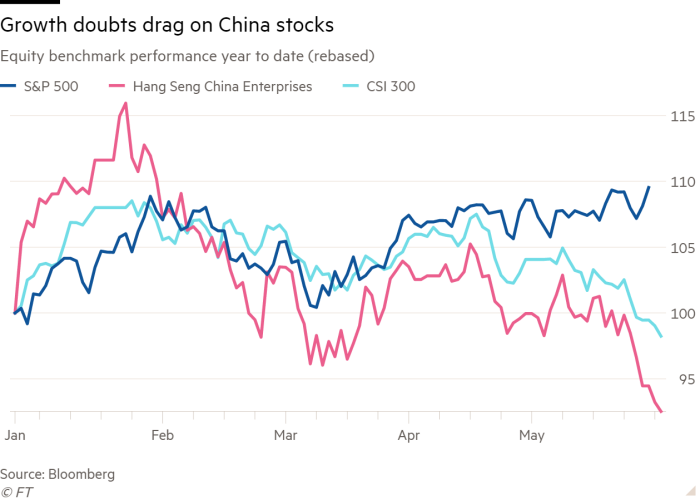[ad_1]
Chinese language shares in Hong Kong fell into bear market territory amid mounting doubts in regards to the outlook for the world’s second-largest financial system and rising tensions between Washington and Beijing
Declines for the Dangle Seng China Enterprises index throughout Asian buying and selling on Tuesday pushed it 20 per cent decrease from its peak in January, putting it in bear territory. A drop for China’s benchmark CSI 300 index of Shanghai- and Shenzhen-listed shares additionally dragged that greater than 10 per cent decrease from its peak this yr, matching the technical definition of a market correction.
The relentless sell-off in Chinese language equities displays a rising consensus amongst traders that the nation’s financial restoration is shedding steam, roughly half a yr after Beijing deserted President Xi Jinping’s disruptive zero-Covid coverage.
Winnie Wu, China fairness strategist at Financial institution of America, stated shoppers had described many Chinese language shares as “too low-cost to brief, however not adequate to go lengthy”. Wu stated that whereas valuations for China shares had develop into engaging, the restoration remained weaker than anticipated and the financial system was prone to proceed underperforming with out extra substantial state assist.
“We count on 2023 to be a yr of weak stimulus, given China’s already excessive debt-GDP [ratio], stretched native authorities fiscal place, and long-term challenges within the property market,” Wu stated.
Slowing momentum throughout a number of sectors in latest weeks has dragged on Chinese language shares relative to their international friends. Whereas the S&P 500 index has climbed greater than 10 per cent yr to this point, the China Enterprises index is down greater than 7 per cent throughout that interval.

Traders are significantly frightened in regards to the property market, the place the newest knowledge exhibits gross sales down greater than a 3rd from pre-pandemic ranges, and about file joblessness amongst Chinese language youth, one in 5 of whom is now unemployed.
Different elements, together with worsening geopolitical tensions with the US, have accelerated the sell-off. Merchants stated losses on Tuesday had been partly spurred by China’s determination to say no a request from the US for a gathering between defence officers at an upcoming safety discussion board in Singapore.
“It’s the financial system, sure, however it’s additionally greater than that,” stated Louis Tse, managing director at Hong Kong-based brokerage Rich Securities.
Tse stated the rate of interest differential between the US and China was driving outflows from China’s authorities bond market, including to downward stress on the renminbi, whereas geopolitical tensions with the US had been stoking worries amongst overseas traders.
“US and European fund managers don’t wish to maintain Chinese language belongings of their portfolios proper now,” Tse stated. “The financial system, the chance premium from US-China tensions, slim market turnover and the renminbi — all of those are coming collectively to drive extra promoting.”
[ad_2]
Source link

